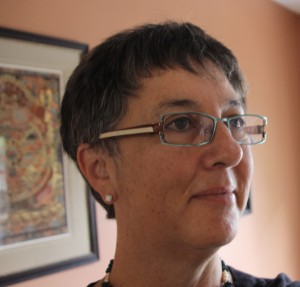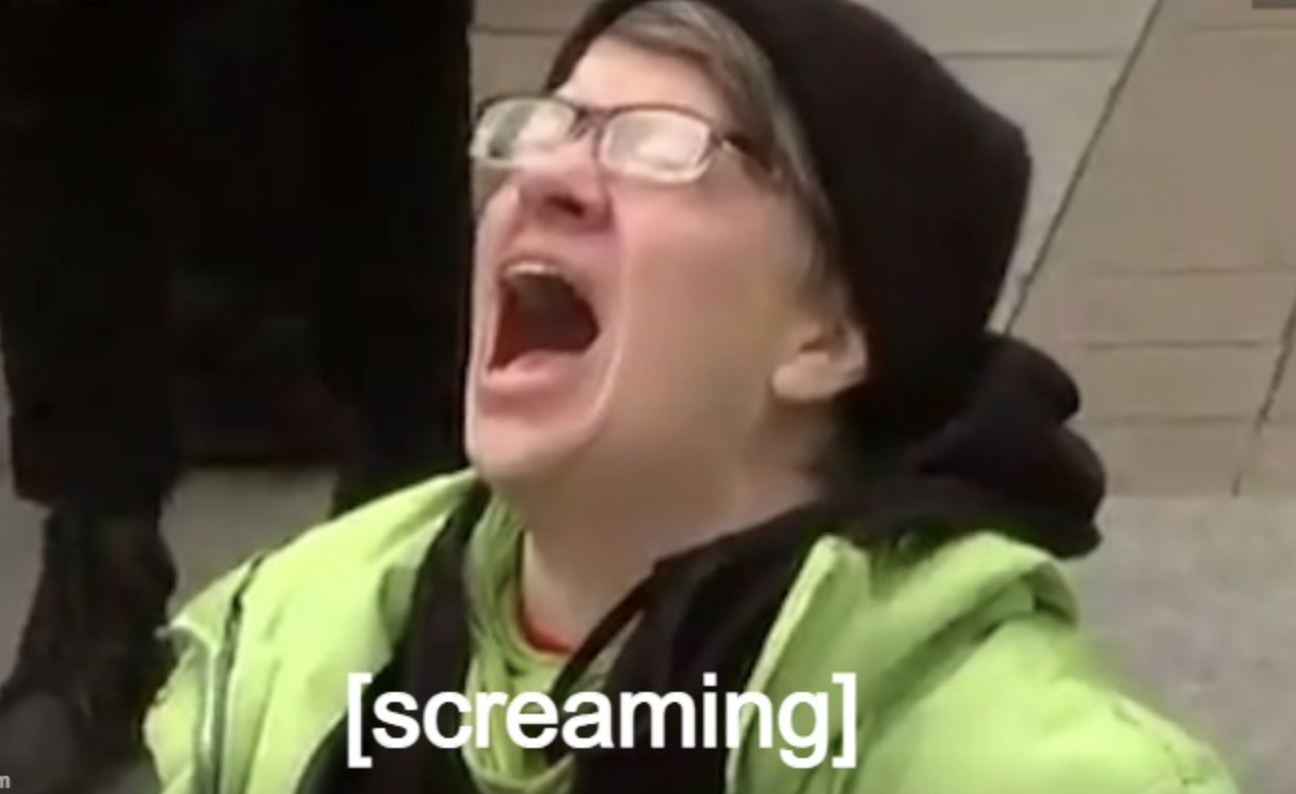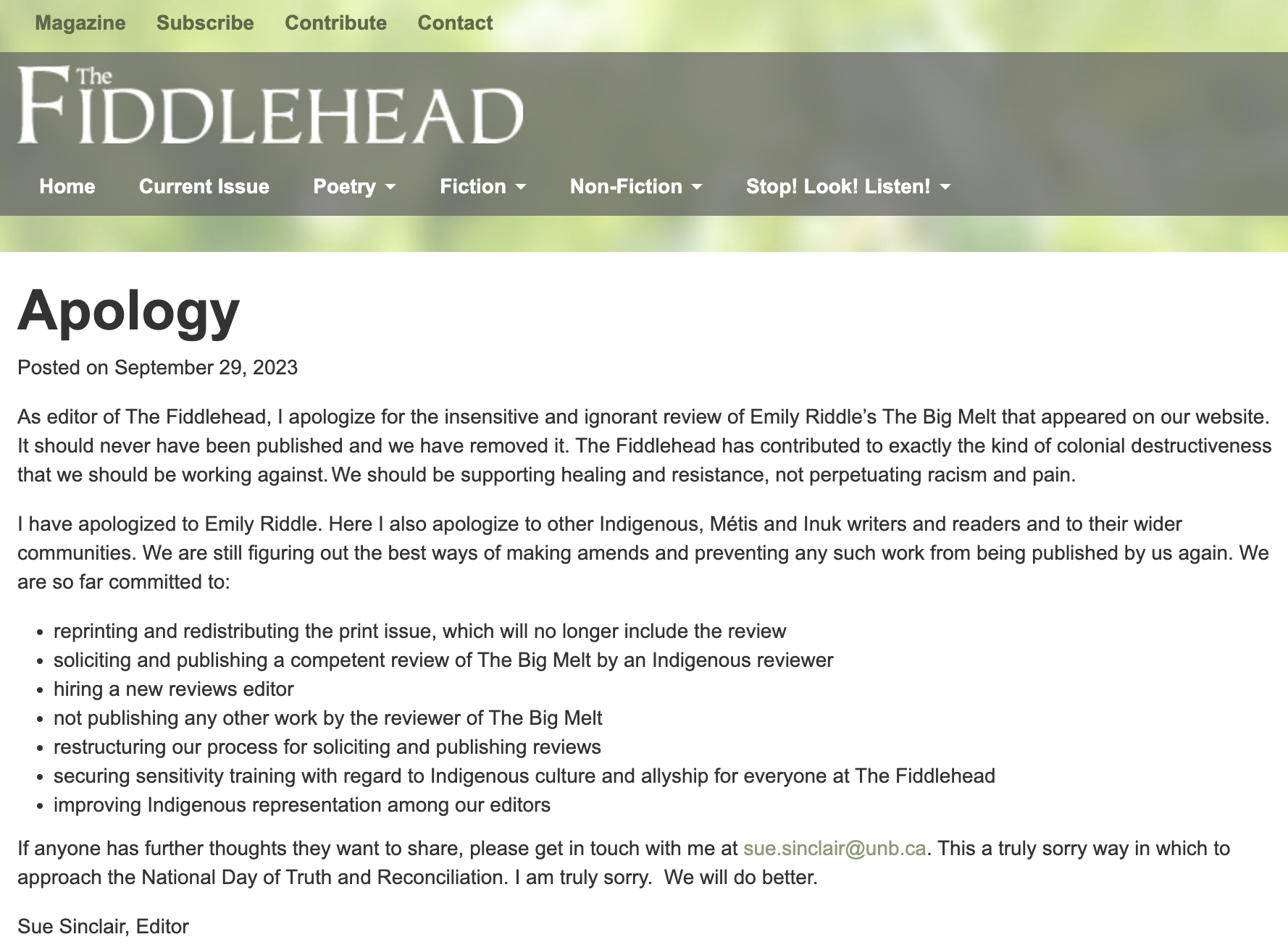 Nadine McInnis is the author of nine books of poetry, short fiction and literary criticism. She has twice been awarded the Ottawa Book Award, most recently in 2016 for her collection of poems, Delirium for Solo Harp. Her most recent book of fiction, Blood Secrets, was long-listed for the international Frank O’Connor Short Story Award and short-listed for the Ottawa Book Award and the ReLit Award. She teaches writing in the Professional Writing program at Algonquin College.
Nadine McInnis is the author of nine books of poetry, short fiction and literary criticism. She has twice been awarded the Ottawa Book Award, most recently in 2016 for her collection of poems, Delirium for Solo Harp. Her most recent book of fiction, Blood Secrets, was long-listed for the international Frank O’Connor Short Story Award and short-listed for the Ottawa Book Award and the ReLit Award. She teaches writing in the Professional Writing program at Algonquin College.
OM: When I had the pleasure of being your student, I was relieved to find you open to whatever we could produce. It was the early 90s, and we were living through a wave of political correctness. One of my fellow classmates did not like the subject matter of the work I had presented for review. In it, bad things happened, and people behaved poorly. It suggested that the world was an unfair place full of competitive, selfish, sometimes cruel people pursuing their own self-interest. My angry classmate seemed to think that all events and subjects in poetry should closely align with the ideal world that social justice warriors were trying to create. Art was an opportunity to advance the agenda of living in this social utopia. You didn’t let their objections close off discussion of the dark world I had imagined, and it was clear from your manner and tone that nothing was going to stop the free flow of ideas in your classroom. In fact, you suggested an even more outrageous direction my poem could take. You can’t be expected to remember the specific incident, but was this something that you had to deal with often in your classes?
NM: It’s interesting to think about earlier and more innocent times! Really, I mean that. The rise of video games, fantasy writing, and political cynicism have made the project to create a better, more fair world almost quaint. So no, I haven’t had to deal with this often in the classroom. Over the last 11 years, I’ve taught younger students at Algonquin College through the Professional Writing program. The people who take one-off creative writing courses through university continuing education programs are older, with professional lives and lots of life experience. They are also products of a time that had a great faith in the power of art to effect change. My younger students have different cultural influences. If they have a political agenda, they tend to focus their energies in advocacy rather than in creative work. Art is for self-exploration, for the joy of creation of a new world. World building is their unique passion, maybe because they don’t believe that a song or story can change the world we currently live in.
OM: Your support was critical at a time when I felt the tide of popular thought turning against me. I believe subject matter is irrelevant in the judgment of art. To take an example from that time, the fact that the main character from American Psycho is a rapey murderer should not be the deciding factor in the success or failure of that work of fiction. And it shouldn’t be assumed that the actions of a main character have any connection with the beliefs and actions of the author. Obvious as these statements may be, they were constantly called into question. Do you think we will ever get to a place where authors of dark fiction aren’t assumed to be dark humans?
NM: I actually think we have achieved this separation, at least among literate readers and literary writers. The exploration of darker forces and urges has never been more urgent. For me, the separation exists more between market-driven writing and literary writing. Is the writer creating feelings of dread and fear in the reader just to effect a shallow catharsis or to open psychological and philosophical exploration? The darkest writer I can think of is Joyce Carol Oates, and in my view she’s one of the most brilliant writers in North America. She channels all the violent and selfish impulses of our society with the intensity of a medium. Writers like her aren’t just striving to stimulate, titillate or feed stereotypes in order to sell books. The marketing agenda is the one that confuses the writer with what they write. I don’t see this as a problem for literary writers.
OM: Now PC 2.0 is sweeping the land with new vocabulary and militancy. In the 90s, the PCers wanted you to know your ideas were wrong. In 2017, they want you to know your ideas are wrong and feel it’s important that you shut up immediately. In addition, they insist all offenders be disciplined, sent for sensitivity training, fired, or criminally charged. Offenders of the past must be deleted from the history books, a thought control technique pulled from the pages of 1984. Statues must be removed, buildings renamed. Right and wrong are easily determined with almost religious certainty, and if charged, there is no room for discussion or debate. There’s a group out there determined to brand Margaret Atwood as a rape apologist. Is a higher level of crazy even possible? Do I sound hysterical? Am I making something out of nothing? Trigger warnings and safe spaces seem to help students avoid certain ideas, speech, and people. This seems to run counter to the very idea of a university, a place where students are exposed to a mix of ideas, speech, and people. Avoiding people and ideas you find distasteful is a great way to create the world’s biggest echo chamber, but perhaps larger society is not served by this practice. On a personal level, I can’t imagine any circumstance in which I would prefer to screen out any thoughts opposed to my own. Isn’t this the death of debate? Isn’t debate one of the pillars of university life? What happens to protected, fragile students when they realize that trigger warnings and safe spaces don’t exist in the real world?
NM: Well, this is a very loaded topic, and obviously, it’s very top-of-mind in all post-secondary institutions. My context might be a little different because I teach at a community college rather than a university. I have faced emotional reactions and sensitivity to reading materials and discussion expressed in the classroom environment but so far I haven’t found it to be very ideologically driven. What I see is many more students than in the past struggling with serious mental health issues. I don’t doubt their distress at all. It’s manifested in so many different ways, including attendance, ability to get the work done or even sit through classes without crying. A firestorm of reasons are responsible for this, including financial pressures, future prospects for the young today, even the brain-changing influence of technology. It’s anyone’s guess as to whether or not maturation will help students be more resilient in the future.
So far, I haven’t had to remove readings but I do usually alert students to the kind of content they will be exposed to and why. For example, tomorrow I’m teaching a class on writing about love and I ground my discussion in courtly love traditions so that they understand that our cultural understanding of love informs even the stories written now. We discuss Barbara Gowdy’s story “We So Seldom Look on Love” (about necrophilia and suicide), George Saunder’s “Escape from Spiderhead” (a speculative story about chemical experiments on prisoners making them act out erotically depending on what is put in their IV) and James Joyce “Araby” which is my more traditional courtly love example. We talk about Eros versus Caritas, and how writers are playing with these ideals and conventions. Because the Gowdy story, in particular, is so morally challenging, I do advise students to go have a coffee if they prefer not to engage. So far, that’s never happened. They stay, they discuss, they continue discussing outside of class.
All this is to say that we all move along seeing what works and what doesn’t, responding as necessary. The classroom is made up of a lot of individuals and a lot of personal dynamics. As are institutions. Where you find the most ideological conflict are places that may well have troubling interpersonal dynamics, including such things as abuse of power. And compounding this, administrations are so focused on the bottom line these days that they may be overly concerned with litigation or marketing and less concerned than they should be on ensuring that universities and colleges are places of higher learning, discussion and exploration. I’m more concerned that these corporate values prevail rather than expression of ideological difference. I don’t hold students responsible for these situations. The discussion is closed down by other forces entirely.
OM: Have you found book tour readings to be an effective way of promoting your books? Is social media a better way to do this considering that it is infinitely scalable and free? I’m guessing that some of the benefits of readings are personal contact with readers, the possibility of local media reporting on it, and winning over new fans. But considering the expense and time required, isn’t social media a better use of resources? What am I missing?
NM: Book tour readings give you an opportunity to meet writers and readers in other communities, which is great. In terms of book promotion, well, I’m not sure the expense is justified by the sales. But maybe not everything should be measured by sales.
No doubt social media could reach more people but I’m not sure what really works in this regard either. We’ve all had the experience of too many Facebook posts about writers’ activities, the feeling of too much marketing coming at us from all directions. I’d rather not add to this deluge. I really miss traditional book reviewing in newspapers… call me old fashioned. I’m one of those people who immediately orders a book if I’m struck by the review.
OM: I’ve always thought Ottawa is a great home for writers, a place where pros and beginners easily mix. You mentioned when you were in Vancouver that there is a great deal of activity here. Which cities have the healthiest ecosystems for writers?
NM: Big cities offer the opportunity to find your specific community from among many communities. Reading series definitely foster writing and ways for writers to stimulate and get to know one another. BC is notable for the number of excellent literary journals and writing programs. Having a variety of literary activities happening in the same place provides a range of ways to be involved at different times in your life. I’ve worked with literary magazines (Arc and CV2), been involved in reading series and taught in a number of contexts, but now I’m focusing on teaching. Later, when I’ve retired, I’ll return to other literary involvements. I’ve always had great respect for prairie literary communities such as Winnipeg, Saskatoon and Regina. They really know how to celebrate their own.
OM: What are some of the pros and cons of teaching writing workshops? It takes time and effort, and you’re often exposed to writing that you would not normally seek out, so what is the net benefit to you?
NM: I’m one of the few lucky writers to have a full-time job teaching writing in a post-secondary environment. I really enjoy working with young people and learn so much about their world views and passions that I wouldn’t otherwise know. The cons are the time and energy taken from writing, but unless a writer in Canada is independently wealthy, other work is a fact of life. I’m happy with the balances I’ve struck in life.
OM: When can we expect your next book?
NM: I’m back to writing short fiction after focusing on poetry again for several years. The writing process is slow for me, especially when I switch genres so I don’t know when I’ll be done.
OM: What does an established writer owe new and emerging writers, if anything?
NM: We owe them faith. Faith in their ability to explore, to reflect, to grow. Faith in the world they’ll help to create, however hard that may be at this time. We owe them the willingness not to destroy their hopes and dreams.




Leave A Comment